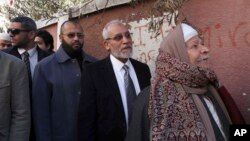Egypt's top religious authority has rejected a death sentence proposed for the leader of the outlawed Muslim Brotherhood and 13 associates for murder and violence, but was asked by a court on Thursday to reconsider.
Mohamed Badie, the Brotherhood's general guide, and the other defendants were sentenced on June 19, but Egyptian law requires any capital sentence to be referred to Grand Mufti Shawqi Allam, Egypt's highest Islamic legal official, for an opinion before any execution can take place.
The Mufti's reports are not normally made public, but one of the three judges in the case said the Mufti had stated that “the investigations and evidence were not enough to carry out the death sentence”.
In a move unprecedented in the history of Egyptian law, the court asked the Mufti to reconsider and adjourned the hearing, in which it was due to either uphold or strike down the original sentence, until Aug. 30.
“The Mufti did not give a religious opinion but interfered in the court's domain by evaluating the evidence of the case,” the judge said.
While many Egyptians have welcomed the army's toppling of elected Islamist president Mohamed Morsi just over a year ago, there is growing unease at the scale and severity of a crackdown on his now-outlawed Muslim Brotherhood.
Several thousand Brotherhood leaders and members have been arrested, many on terrorism charges, since Morsi's overthrow.
Hurried verdicts
Proposed death sentences against more than a thousand of these have triggered outrage among Western governments and human rights groups, who have condemned the hurried way in which the courts have reached such serious verdicts. No execution has yet been carried out, and hundreds are awaiting the Mufti's opinion.
President Abdel Fattah el-Sissi, who as army chief overthrew Morsi, said in the run-up to his election in May that the Brotherhood - Egypt's oldest and best organized political group - was finished and would cease to exist under his rule.
Among the defendants in the Cairo case are senior Brotherhood members Mohamed El-Beltagi and Essam El-Erian, as well as former members of the Morsi government. Six of the accused are on the run.
The defendants are accused of killing nine people and incitement to kill that led to 21 other deaths in clashes that took place near the Istiqama Mosque on the outskirts of Cairo in July 2013, after Morsi was ousted.
Judge Mohamed Nagi Shehata, who is leading the proceedings, also presided over the controversial trial that saw three Al Jazeera journalists jailed for seven to 10 years. But one of his assisting judges, Ihab al-Manufi, had already refused to sign the original death sentence issued in June, signaling that, even within the judiciary, there is disquiet over the trials.
Ibrahim Negm, a senior adviser to the Grand Mufti, said that Islamic law required the religious authorities to review all the evidence in a case and that, if asked to examine the case again, they would again look at all the evidence.
“Religious authorities are always encouraged to abide by the well-established principle that even slight doubts may give reason to cancel the stipulated penalties,” he said in emailed comments.
Badie and 182 other Brotherhood supporters have already had their death sentences in a separate case confirmed after the Mufti's report. They have the right to appeal.





